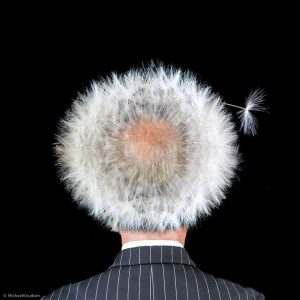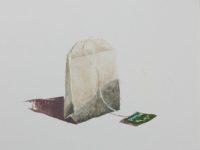Trastorno antipático crónico / Chronic Antipathic Disorder
Registro del día 11 del mes de enero del año 2013, en mi diario personal (20 años de edad).
Trastorno antipático crónico, fue la enfermedad que el psiquiatra me diagnosticó. «No es culpa de la gente el que les sea tan difícil convivir contigo, ni es culpa de las personas que aterrorizas el que no puedan replicar adecuada y respetuosamente tus palabras; es culpa tuya», fue lo que me dijo el psiquiatra, mientras me miraba con unos ojos torturadores, que me invitaban a dudar de su profesionalismo y de su sinceridad ¿En verdad este hombre estaba aquí para ayudarme? La buena noticia fue que el trastorno no requería de internamiento en el manicomio, sino solamente el simple consumo de una droga cuyos efectos eran una inicial relajación, y una posterior sensación absurda de satisfacción, absurda porque no había facto por el cual estar satisfecho, y aún así uno se sentiría pleno y realizado: Un engaño cínico al alma.
Aquella tarde regresé al edificio que solía llamar «hogar». Me senté en una cama del tercer piso y miré el botecillo de las píldoras mágicas que resolverían cualquier problema haciéndome creer que el problema estaría ya resuelto. Así, el más grande avance de la psiquiatría para tratar el trastorno antipático crónico era una degeneración de la percepción del mundo ¿Acaso no era esa razón suficiente para sospechar de la medicina psiquiátrica? Ellos querían pervertir mi percepción del mundo, porque era demasiado fiel, tanto que podía notar horripilantes detalles que otros no notaban, y eso impedía que me relacionara tranquilamente con ellos.
Pero ¿por qué querría relacionarme así con ellos? Si el mundo material está siempre entre yo y cualquier persona ¿por qué pervertir el medio que nos conecta? Yo creía que si algo así se hacía, en lugar de mejorar la relación humana, se perturbaría y se arruinaría; pero lo que en realidad sucedería sería algo que los médicos psiquiatras no podrían notar. Al degenerar mi percepción del mundo, mi relación con los otros mejoraría, porque ya no vería tan nítidamente su imagen, de forma tal que percibiría solo una turbiedad, la cual repararía en mi mente, para crear una imagen más nítida, con ayuda de mis ideales sobre las personas; la degeneración de la percepción me ayudaría a engañarme, creyendo que la gente es como yo quisiera que fuera.
¿Y por qué tengo que degenerar mi percepción para lograr tales fines? Porque la percepción tan nítida me hace darme cuenta de lo horrible que las personas son. Con las drogas las personas no cambiarían, solo yo, pues las percibiría defectuosamente.
Después de 3 horas de dialogar conmigo mismo sobre el funcionamiento de la droga mágica, llegué a la conclusión de que no me serviría, pues lo único que lograría sería entorpecer mi relación con el mundo material, y así, nublar mi relación con las personas. Yo creería que el mundo sería maravilloso, pero seguiría siendo tan no maravilloso como lo ha sido antes.
Lancé el frasco fuertemente contra la ventana, tanto que este la rompió y cayó en la calle, donde quizás algún perro callejero solitario las encontró, las consumió, y se convenció finalmente de que el mundo era hermoso. Un perro, tan torpe y poco habilidoso a lado de un humano, quizás podría preferir la droga a la realidad; pero yo, un humano, capaz de racionalizar y entender lo que estaba sucediendo, no podía perder el tiempo con soluciones vacuas; yo podía pensar, actuar, y manipular el mundo; y sería un enorme desperdicio que lo dejara así.
Esto,,, no lo hacía por mi bien, pues yo sabía que siempre me tendría yo. Esto,,, lo hacía por las demás almas, perdidas, nubladas de la percepción de la realidad.
Esa noche comencé a sospechar lo que después descubriría; que todos los supuestos trastornados de la sociedad en realidad eran los menos atrofiados en su percepción de la realidad, y aquellos que eran normales eran los más degenerados en su relación estética con el mundo.
La cura a mi trastorno sería curar al mundo, para que una vez, con los ojos abiertos, se dieren cuenta de que no deben llamar “trastorno” a lo que yo tenía, que era simplemente una percepción más nítida de la realidad.
Al lanzar el frasco el enorme ventanal se destrozó completamente, y así fue la única forma en la que ese frasco de medicinas pudo ayudar, al aumentar mi percepción del exterior del edificio, destruyendo el vidrio polarizado sucio del ventanal del tercer piso. Pero eso causó incomodidad en mi cuerpo, pues el frío aumentó, y ya no podía dormir en ese piso. Me fui entonces al cuarto piso, en donde pude mirar desde mayor altura a la gente del exterior, y estuve protegido de las condiciones indeseables del resto del mundo:::
Había una mayor distancia entre yo y el mundo.

Chronic Antipathic Disorder
Register from the 11th of January of 2013, in my personal diary (20 years old). Translated from Spanish.
Chronic antipathetic disorder, was the ailment that the psychiatrist diagnosed me. «It is not the fault of the people that it be so hard to get along with thee, neither it’s the fault of the persons that thou terrorisest that they can’t adequately nor respectfully reply thy words; it is thy fault», said the psychiatrist, while he looked at me with torturing eyes that invited me to doubt of his professionalism and of his sincerity. Was this man truly here to help me? The good news were that the disorder did not require me to be interned in the madhouse, but only the simple consumption of a drug whose effects were an initial relaxation, and a posterior absurd sensation of satisfaction, absurd because there was no fact to be satisfied about, and yet I would feel booming, realised and accomplished: A cynical deceit for the soul.
That afternoon I returned back to the building that I used to call «home». I sat upon a bed at the third floor and I looked at the little bottle of magic pills that would solve any problem making me believe that the problem would be already resolved. Thus, the greatest advance of psychiatry for treating the chronic antipathic disorder was a degeneration of the perception of the world; was that not a sufficient reason to suspect of psychiatric medicine? They wanted to pervert my perception of the world, because it was too faithful, so much that I could notice horrifying details that others did not, and that impeded me to relate tranquilly with them.
But why would I want to relate thus with them? If the material world is always between I and any person, why to pervert the medium that connects us? I thought that if something like that was done, instead of meliorating a human relationship, it would be perturbed and ruined; but what would happen in reality would be something that the doctors in psychiatry could not notice. Whilst degenerating my perception of the world, my relation with the other would improve, because I would not see so nitid their image, and thenceforth I would perceive only a turbidity, that I would repair in my mind to create a more nitid image, with the help of my ideals about the persons; the degeneration of the perception would help me to deceive myself, believing that a person is as I wish he were.
And why ought I to degenerate my perception to achieve such ends? Because the perception that is so nitid makes me notice how horrible the persons are. With the drugs the persons would not change, only I, for I would perceive them defectively.
After 3 hours of dialoguing with myself on the functioning of the magical drug, I arrived to the conclusion that it would not serve for me, because the only thing that it would achieve would be to hinder my relation with the material world, and hence, to cloud my relation with the persons. I would believe that the world would be marvelous, yet it would keep being as non wonderful as it has been before.
I threw the jar forcefully against the window, so hard that the jar broke the window and felt to the street, where perhaps some lonely street dog found the pills, consumed them, and finally got convinced about the world being beautiful. A dog, so clumsy and little skilled compared to a human, mayhap could prefer the drug to the reality; but I, a human capable of rationalising and understanding what was happening, could not lose the time with vacuous solutions; I could think, act, and manipulate the world; and to leave it thus would be an enormous waste.
This,,, I did not do it for my own benefit, for I knew that I would always have me. This,,, I did it for the other souls, lost, clouded of the perception of the reality.
That night I started to suspect what I would later discover: that all the supposed deranged ones of society were in reality the least attrofiated in their perception of the reality, and that those that were normal were the most degenerated ones in their aesthetic relation with the world.
The cure to my disorder would be to cure the world, so they then, with their eyes open, could understand that they ought not to call disorder to what I had, which was simply a more nitid perception of the reality.
While throwing the jar the enormous window got destroyed completely, and that was the only form in which that jar of medicine could help: augmenting my perception of the exterior of the edifice, destroying the dirty polarised glass of the window of the third floor. Yet that caused discomfort in my body, for the cold increased, and I could not sleep in that floor anymore. I went then to the fourth floor, where I could watch the people of the exterior from a higher height, and I was protected from the undesirable conditions of the rest of the world:::
There was a larger distance betwixt I and the world.
Roberto Dan Medrano González
3,634 total views, 4 views today








